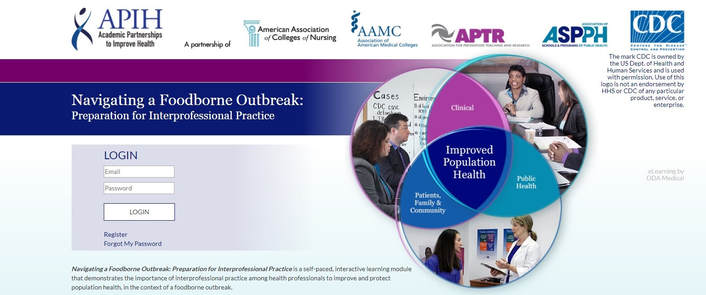Navigating a Foodborne Outbreak: Preparation for Interprofessional Practice is a self-paced, interactive, online teaching module that demonstrates the importance of interprofessional practice among health professionals to improve and protect population health. The case scenario of the module is a fictional foodborne illness based on the 2015-2016 multi-state outbreak of Salmonella Poona associated with cucumbers.
The module takes a minimum of 90 minutes to complete and encourages learners to deepen their knowledge through links to a variety of resources that go into greater depth and tie the management of the outbreak to other types of public health emergencies. Subject matter experts from state and local public health departments and the Centers for Disease Control and Prevention (CDC), including one who was involved in the S. Poona outbreak, provided guidance for the project.
The module includes:
The overarching competency for the module is to “describe how professionals in health and other fields can collaborate and integrate clinical care and public health interventions to optimize population health" (Interprofessional Education Collaborative (IPEC) Core Competencies for Interprofessional Collaborative Practice Competency RR-10). Three sub-competencies and 28 learning objectives frame the module content.
Target Audience
The module specifically targets medical, nursing (baccalaureate, master’s, and doctoral level), and public health (baccalaureate and master’s level) students, and may also be relevant to other health professionals at various stages of their training.
To access the module, please visit: https://navigatinganoutbreakmodule.org
The module takes a minimum of 90 minutes to complete and encourages learners to deepen their knowledge through links to a variety of resources that go into greater depth and tie the management of the outbreak to other types of public health emergencies. Subject matter experts from state and local public health departments and the Centers for Disease Control and Prevention (CDC), including one who was involved in the S. Poona outbreak, provided guidance for the project.
The module includes:
- Pre-module assessment
- Case scenario videos
- Supporting resources that can be saved to a personal library
- Post-module assessment
- Certificate of Completion
The overarching competency for the module is to “describe how professionals in health and other fields can collaborate and integrate clinical care and public health interventions to optimize population health" (Interprofessional Education Collaborative (IPEC) Core Competencies for Interprofessional Collaborative Practice Competency RR-10). Three sub-competencies and 28 learning objectives frame the module content.
Target Audience
The module specifically targets medical, nursing (baccalaureate, master’s, and doctoral level), and public health (baccalaureate and master’s level) students, and may also be relevant to other health professionals at various stages of their training.
To access the module, please visit: https://navigatinganoutbreakmodule.org
Navigating a Foodborne Outbreak: Preparation for Interprofessional Practice was developed collaboratively by the four national associations that comprise the Centers for Disease Control and Prevention's (CDC) Academic Partnerships to Improve Health (APIH) initiative with expertise, guidance, and funding provided by CDC. The APIH associations are:
Funding for this module was made possible by the Centers for Disease Control and Prevention (cooperative agreement numbers NU36OE000004, NU36OE000002, NU36OE000003,NU36OE000005 ), Centers for Surveillance, Epidemiology and Laboratory Services. The views expressed in the module do not necessarily reflect the official policies of the Department of Health and Human Services, nor does the mention of trade names, commercial practices, or organizations imply endorsement by the U.S. Government.
Funding for this module was made possible by the Centers for Disease Control and Prevention (cooperative agreement numbers NU36OE000004, NU36OE000002, NU36OE000003,NU36OE000005 ), Centers for Surveillance, Epidemiology and Laboratory Services. The views expressed in the module do not necessarily reflect the official policies of the Department of Health and Human Services, nor does the mention of trade names, commercial practices, or organizations imply endorsement by the U.S. Government.

